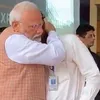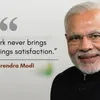On Prime Minister Narendra Modi’s 69th birthday, his compelling Mann ki Baat inspires
As Indian Prime Minister Narendra Modi turns 69, it is only apt to revisit his deepest thoughts and ideologies through his ‘straight from the heart’ dialogues that shaped the nation in 2019.
Born to a lower-middle-class family in Vadnagar at Mehsana District in Gujarat, he used to sell tea at the railway station with his father. That stall is being converted into a tourist spot soon. Destiny had august plans for this lad who later pursued a masters in political science from Gujarat University, and worked with the RSS tirelessly.
From being elected the Chief Minister of Gujarat for three consecutive terms including winning the Lok Sabha elections by a large margin in 2014, to be sworn in as the Prime Minister of India twice, Narendra Modi’s journey has been on song as he connects with the citizens of India.

The Prime Minister of India, Narendra Modi.
Image Credit: Shutterstock
As he turns 69 this September 17, here are some of the thoughts and ideologies he shared with the nation in 2019 through his Mann ki Baat, a programme aimed at spreading his message to the people on platforms like All India Radio, DD National, and DD News.
SocialStory has compiled some of the key highlights of this year’s show here.
Nature and wildlife conservation
Prime Minister Narendra Modi emphasised on the importance of conserving the environment in innumerable talks. His appearance on the renowned television adventure show, Man Vs Wild with Bear Grylls was much talked about this year.

The recent census of tigers in India indicates the existence of 2,967 of them.
Modi dedicated one of the episodes on Mann ki Baat to express his views on conservation. He stressed that it was necessary for people to move a step ahead of conservation, and think about compassion. The Prime Minister even commented on the recent census on tigers which then stood at 2,967.
Quoting the scriptures, he said that in the absence of the striped animal, men would cut down trees and destroy forests irrevocably.
He also urged citizens to protect tigers, and create an environment where they can live peacefully, unharmed.
Elimination of single-use plastic
It is estimated that a massive 25,940 tonnes of plastic waste are generated in India every day, according to a report published by the Central Pollution Control Board (CPCB) in 2017. Most single-use plastic items like grocery bags, food wrappers, water bottles, etc, end up in landfills, oceans and other water bodies causing grave harm to both the environment and human existence.
Being non-biodegradable in nature, these materials remain in the soil or water for long, letting out toxic pollutants into the surroundings.

Single-use plastic being non-biodegradable is very harmful for plant and human life.
With this in mind, Modi aspires to launch a new mass movement against single-use plastic from October 2 this year, on the birth anniversary of Mahatma Gandhi.
In his monthly address, “as part of Mann ki Baat,” the Prime Minister asked people to ensure proper collection and disposal of plastic to safeguard the environment.
India’s space mission
After India got close to landing a probe on the Moon with the launch of Chandrayaan 2, but, lost contact in the last few metres, there are many disappointed souls. Most heartfelt was Indian Space Research Organisation's (ISRO) Chief K Sivan, who was inconsolable.
A picture of Modi hugging a tearful Sivan has gone viral since showing the Prime Minister’s empathy and care.

Chandrayaan 2 was launched by ISRO to probe the moon.
Modi also appreciated ISRO’s effort on Mann ki Baat, and went onto say that the mission filled the heart of every citizen with pride, enthusiasm and happiness. He felt that Chandrayaan 2 managed to deepen our understanding of the Moon, and that temporary setbacks need to be overcome, and taken in their stride.
Tourism in the North-East
The north-eastern region of India is known to be one of the most picturesque areas in the country. Dotted with valleys, mountain ranges and unique river islands, its geographical location also makes it among the most untouched areas in India.
Modi reiterated this on Mann ki Baat, revealing the glorious abundance of nature in the northeast and its towering peaks like the Kanchenjunga.

Tawang, Arunachal Pradesh in the north-east region of India.
The Prime Minister wanted Indians to visit these gorgeous destinations, and revel in the peace and quiet of this haven.
Bravery of soldiers
Soldiers are the epitome of bravery and strength of a nation. Modi concurred with this thought, and saluted the Indian jawans who sacrificed their lives in the Pulwama attack in February. He also spoke about how martyrdom strengthens the country’s resolve, and inspires people to overcome terror.

Indian soldiers attempting to place the national flag after winning a war.
The Prime Minister who light the flame at the launch of the National War Memorial in February 2019, spoke about the memorial and explained the significance, and the reason it is centred on four concentric circles – he said it was the journey from a soldier's birth to martyrdom.
He quoted the example of Birsa Munda, the Indian freedom fighter who fought for the rights of tribals, and spearheaded the Millenarian movement that sought the transformation of society across all parameters in Bihar and Jharkhand during the British Raj rule. Modi wanted the youth of India to take inspiration from Munda, and create their own transformation.
(Edited by Suruchi Kapur Gomes)










